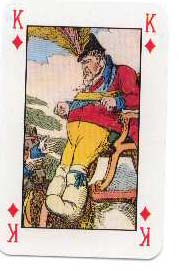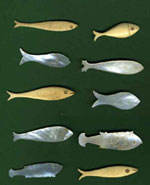Having nearly forgotten my day for blogging, I have turned once again to Hone’s The Every-Day Book. Quite a bit of January 11 is devoted to card-playing. Hone tells us that
 This diversion resorted to at visitings during the twelve days of Christmas, as of ancient custom, continues without abatement during the prolongation of friendly meetings at this season. Persons who are opposed to this recreation from religious scruples, do not seem to distinguish between its use and abuse.
This diversion resorted to at visitings during the twelve days of Christmas, as of ancient custom, continues without abatement during the prolongation of friendly meetings at this season. Persons who are opposed to this recreation from religious scruples, do not seem to distinguish between its use and abuse.
He goes on to say that Cards are not here introduced with a view of seducing parents to rear their sons as gamblers and blacklegs or their daughters to a life of scandal, an old age of cards, but to impress upon them the importance of not morosely refusing to participate in that the archdeacon refers to as of the ‘harmless mirth and innocent amusements of society.’
In Pride & Prejudice, Mrs. Philips’s evening party includes cards and even gambling. Mrs. Philips keeps a genteel, middle class home, so the gambling in this case probably did not involve money, but it was gambling nonetheless.
The fish Lydia is talking about refers to gaming tokens, frequently made of mother of pearl and not uncommonly used in card games.
Fortunately for us, some of these young men and women were seduced into being blacklegs and scandalous ladies. Where would our stories be without them? On the other hand, we’re equally entertained by the ‘harmless mirth and innocent amusements of society.’ It all depends on the plot.
Do you prefer the scandalous ladies and gambling gentleman or are you partial to those indulging in innocent amusement? Or perhaps both?


Oh I think I rather prefer the lady and gentleman gamblers. The higher the stakes the more you learn about who a person truly is. Great post! One for the research notebook.